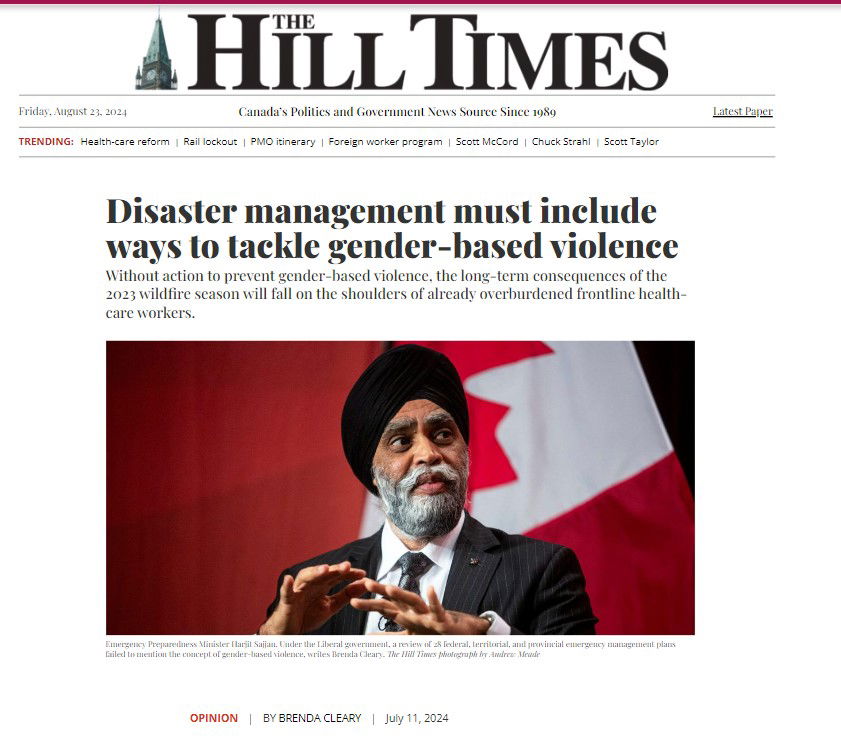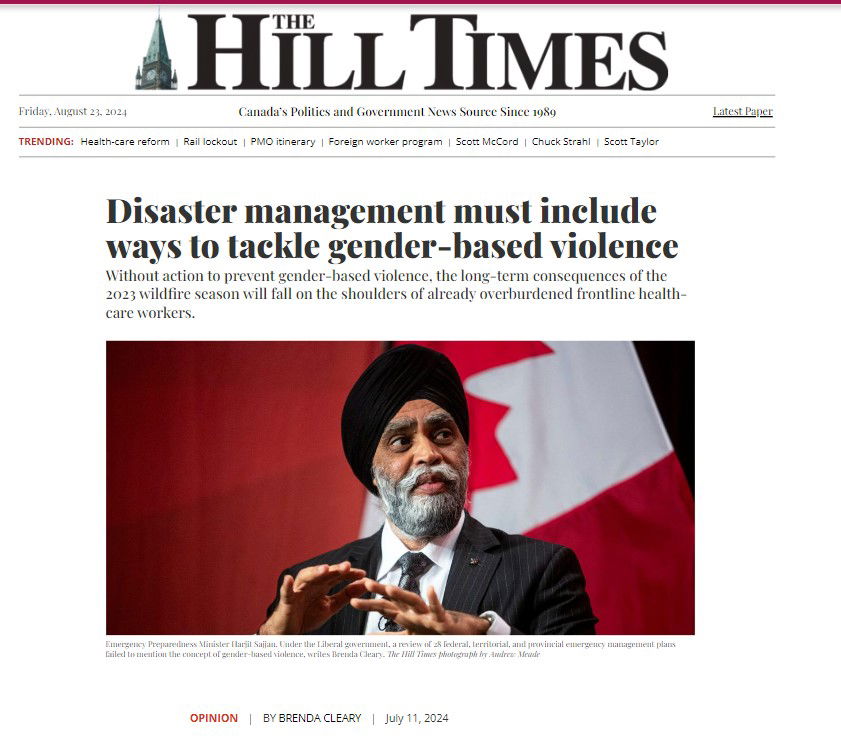Op-Ed: Disaster management must include ways to tackle gender-based violence


Brenda Cleary, MSc RN The 2024 forest fire season is upon us and few are thinking about ongoing fallout from the 2023 fire season: by September of last year fires had torched a staggering 16.5 million hectares of land. Disasters represent the “perfect storm” for gendered psychological, sexual and physical violence in the private sphere to remain hidden. According to a 2018 survey a Canadian woman is killed by an intimate partner every 6 days. In the years since the world has lived through a global pandemic and myriad climate events. As of 2022 official statistics a woman is killed almost every two days in Canada by an intimate partner. Indigenous women are killed at a rate nearly 12 times higher than non-Indigenous counterparts: many originating from fire prone rural areas: we need to #CallItFemicide. I am a nurse and have sometimes been the only lifeline for a woman increasingly isolated and abused: GBV is a public health crisis that needs a public health response before it’s too late for her. American policies reflect this and our Canadian policies don’t.Nurses and other frontline workers will be nursing the violent fallout from the historic 2023 fire season for years to come. The 2009 “Black Saturday '' bushfires in Victoria, Australia revealed a direct linear correlation between the severity of the acreage burned and severity of GBV to follow. Violence stays elevated for years following the “heroic phase” of disaster response. Under the Trudeau government, a review of 28 federal, territorial and provincial emergency management plans failed to mention the concept of GBV. In an absence of action to prevent GBV the long-term consequences of the 2023 Canadian wildfire season will fall on the shoulders of already overburdened frontline healthcare workers. We have our hands full but good policies and protocols still hold us accountable to the duty to respond to a national crisis. GBV is often hard to detect. It is by nature quiet, sometimes a victim doesn’t know that they are being abused: leaving an abuser takes a long time. Nurses see first-hand how abused women tend to have higher rates of physical ailments and apparent somatization of related stressors: insomnia, sexual health concerns, gastrointestinal disorders, depression & anxiety, pregnancy complications, chronic pain and a corroded sense of self-esteem. Even “low-severity” control, emotional abuse and deliberate isolation can rival the overall health consequences of high intensity intermittent violence. HCPs are frequently the first line contact capable of identifying, preventing and implementing support for those experiencing GBV. We are a female dominated profession sensitized to an issue where emergency management may not be.Unlike the US however, Canada no longer implements universal GBV primary health screening schedules for all women. The shift in policy followed an old report stating that, while identification of intimate partner violence increased with universal screening it did not have a significant impact on decreasing violence or improving women’s health in follow-up studies. Yet the evidence behind evidence-based policy deserves review. Retention rates in this study were low, no evidence was given as to how HCPs used the screening results or if adequate and adapted programs were available for women referred to them. Measuring if HCPs know how to sensitively and effectively respond to GBV is hard to measure. Rank and file nurses spend the most time with patients and many are survivors ourselves. We are most likely to “get it” but we didn’t do the screening. We do know that, 400% more abused survivors who underwent universal screening discussed violence with their physicians than abuse survivors who were not screened. That’s a lifeline that if used well could save a life once every 48 hours in this country.Canadians accounted for 43% of people globally displaced by fire in 2023. By now many of the displaced have intersected with the Canadian healthcare system: the one network positioned to respond effectively to this epidemic if trained, sustained and resourced effectively. Tapping into the collective intelligence of my fellow nurses cannot be ignored of we are to work together on this critical issue of our time, one threatening the very foundation of equality we Canadians stand for.